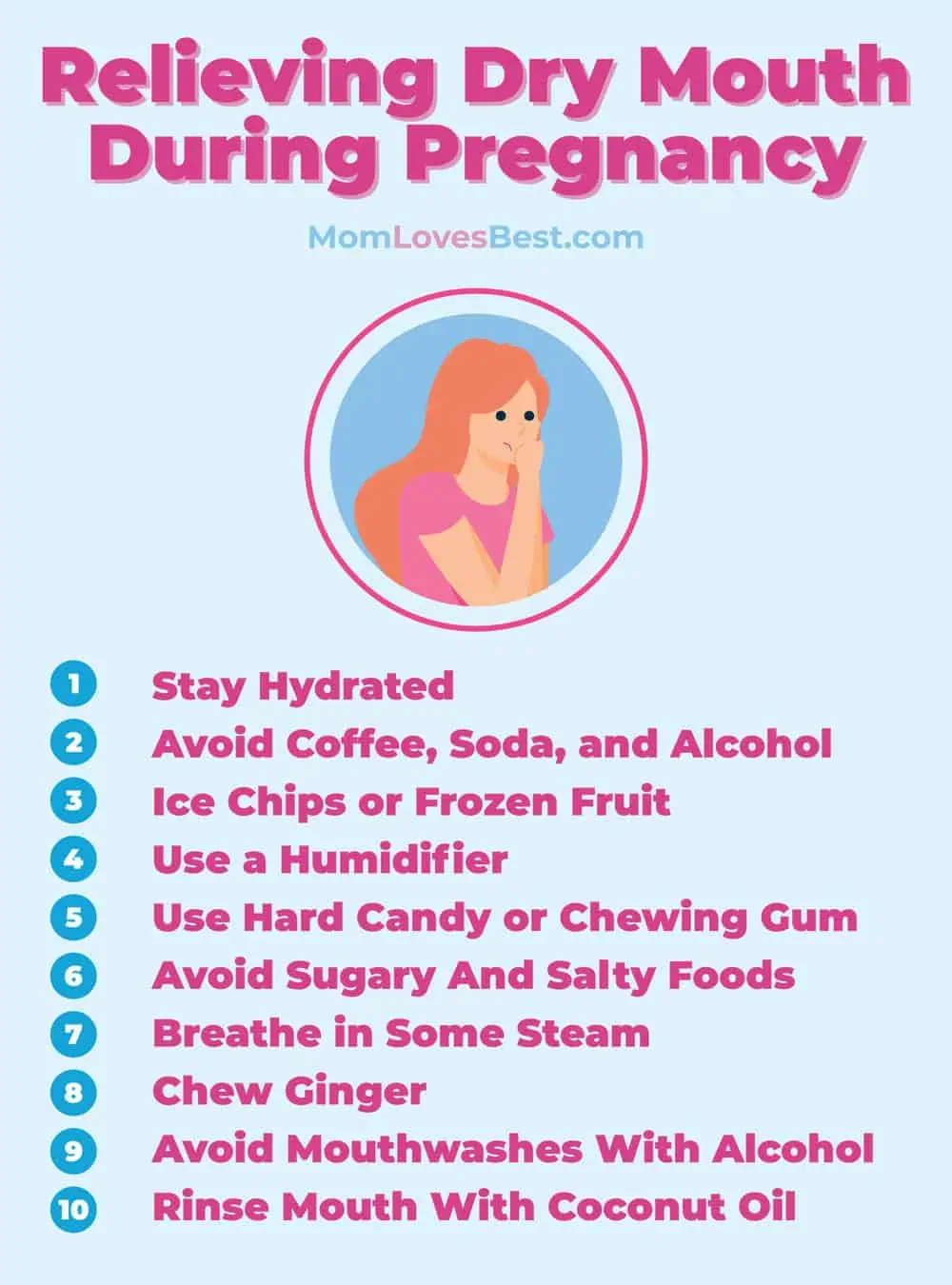Are you pregnant and waking up parched a million times a night? Are you constantly chugging water, only to have to run to the bathroom to empty your ever-shrinking bladder?
We’ve been there, so we were just as eager to find a solution as we know you are.
We extensively researched the causes of dry mouth during pregnancy and have discovered several tactics for relieving this discomfort.
In this article, we discuss why good oral hygiene is important during pregnancy and what you can do to help your dry mouth feel normal again.
Key Takeaways
- Dry mouth during pregnancy can be caused by various factors such as dehydration, hormonal changes, increased blood production, gestational diabetes, and medications.
- Good oral hygiene is important during pregnancy as dry mouth can trap food in teeth and gums, promoting bacterial growth and leading to bad breath, bleeding gums, infections, and tooth decay.
- To alleviate dry mouth symptoms, pregnant women should maintain a proper fluid intake, maintain good oral hygiene, and visit their dentist regularly.
- Pregnant women are more vulnerable to dental problems due to hormonal changes, so it’s essential to take good care of oral health to avoid potential complications.
What’s Causing My Dry Mouth During Pregnancy?
Here are five reasons for this issue.
1. Dehydration
Something as simple as dehydration — not drinking enough water — could be the culprit. Your body is working harder than ever to nourish your baby. So, your metabolic rate speeds up, increasing your need for calories and fluids. The water you consume helps deliver all the essential nutrients to your placenta and can increase your energy and aid digestion.
2. Hormonal Changes
Your changing hormones can cause a reduction in saliva — especially if you’re still in the first trimester — creating your dry mouth.
3. Increased Blood Production
Pregnant women have as much as 50 percent more blood flowing through them to reach the placenta and meet the baby’s needs (1). So, to keep blood volume high, the body may retain water during pregnancy, and this may cause dry mouth.
The increase in blood also causes extra fluids to be excreted through your kidneys, causing frequent urination. As your body loses additional fluids, you can be left with a dry mouth.
Because your blood volume is higher in pregnancy, it is necessary to keep up your fluid intake. This fact alone can contribute greatly to dry mouth, especially as your blood volume is increasing in early pregnancy. An additional 1-2 cups of water a day will help keep you hydrated.
4. Gestational Diabetes
Gestational diabetes is abnormally high glucose levels in your blood triggered by pregnancy. It causes frequent urination and excessive thirst, which could be a reason for your dry mouth.
Most women are screened for gestational diabetes between the 24th and 28th weeks of pregnancy. But if you’re concerned earlier, request a test from your healthcare provider, as gestational diabetes puts mom and baby at risk for complications (2).
5. Medications
Medications, such as antihistamines, painkillers, decongestants, diuretics, antidepressants, or other prescription drugs, could be another underlying cause. There are over 400 medications that list dry mouth as an adverse reaction (3). If you feel like your dry mouth may be a reaction to a medication or supplement you’re on, speak with your health care provider.
Oral Health And Pregnancy
Did You Know?
Dry mouth can trap food in your teeth, gums, and back of your mouth, promoting bacterial growth. The low levels of saliva associated with the condition reduce your ability to fight off bacteria.
While dry mouth is usually not serious, the bacteria will build up if you don’t treat it, potentially leading to bad breath, bleeding gums, infections, and even tooth decay (5).
An infection in the mouth due to poor oral hygiene can cause infections around the heart. Keep up with your oral hygiene and dental appointments, even when pregnant.
Editor's Note:
Katelyn Holt RN, BSN, BCPregnant women are more vulnerable to dental problems. Hormonal changes in pregnancy can lead to “pregnancy gingivitis,” which may cause gum swelling, bleeding, or tenderness (6).
As you are more susceptible to dental problems, it is vital to take good care of your oral health. Otherwise, it could affect your health, pregnancy, and baby’s health.
Relieving Dry Mouth During Pregnancy
1. Stay Hydrated
Staying hydrated is key to preventing dry mouth. During pregnancy, you should be drinking ten 8 ounce cups of fluids each day, preferably water.
Coconut water, tea, and fruit juice are other good options. Sip on fluids throughout the day to stay well hydrated. Dark yellow urine means you need to drink more water. If it’s clear yellow, you’re staying hydrated.
2. Avoid Coffee, Soda, and Alcohol
Coffee, soda, and alcohol all cause dehydration and dry out the mouth, so it is best to avoid them, which you should be doing during pregnancy anyway (or at least keeping caffeine to an absolute minimum) (7).
3. Ice Chips or Frozen Fruit
Sucking on ice chips or frozen fruit throughout the day will moisten your mouth, keep you hydrated, and soothe any mouth sores you may have.
4. Use a Humidifier
Using a humidifier at night keeps moisture in the air and helps with your dry mouth. Be sure to empty and clean your humidifier often to prevent bacteria and mold growth. Choosing a “cool mist” humidifier decreases the risk of bacteria growth as bacteria like a warm moist environment.
5. Use Hard Candy or Chewing Gum
Chewing on sugarless hard candy or chewing gum can stimulate saliva flow and keep your mouth lubricated.
6. Avoid Sugary And Salty Foods
Sugary and salty foods irritate and dry out your already dry mouth. So, avoid foods high in sugar and salt content, such as potato chips, pretzels, chocolate, ice cream, and many other processed foods.
7. Breathe in Some Steam
Breathing in steam for 10-15 minutes daily opens up your airways and relieves your dry mouth. Take some time for yourself, and take a nice steamy shower, or warm up some water in a tea kettle and breathe in the steam from a mug.
8. Try Ginger
Chewing on ginger or drinking ginger tea might be a relief, as it activates the salivary glands and freshens the mouth. Plus, ginger helps with nausea during pregnancy, which is a bonus for mamas with morning sickness.
9. Avoid Mouthwashes With Alcohol
If you’re big on mouthwash, be sure your brand is alcohol-free, as alcohol can be drying. Most mouthwashes do contain alcohol, so if you must use mouthwash, look into buying one specifically designed for dry mouth.
10. Oil Up
“Pulling” coconut oil not only works for dry mouth, but it also whitens your teeth, freshens your breath, kills bacteria, and can even help with tooth decay (8).
Take two teaspoons of coconut oil (preferably organic, unrefined, cold-pressed) and lightly swish it around in your mouth for about 10-20 minutes (or at least for as long as you can withstand). You may have to chew the oil for a few seconds first to break the solid into a liquid.
After the 10-20 minutes are up, spit it out, and rinse your mouth with water. A perfect time to do this is while you shower or as you get ready in the morning.
FAQs
.Hit Refresh On Dry Mouth
Dry mouth is just one of the many changes your body experiences during pregnancy. It’s quite a nuisance but can easily be prevented and relieved with the ten tips we’ve listed above.
The condition usually isn’t serious, but if left untreated, it could lead to serious dental complications, which you’re already at higher risk for during pregnancy.











